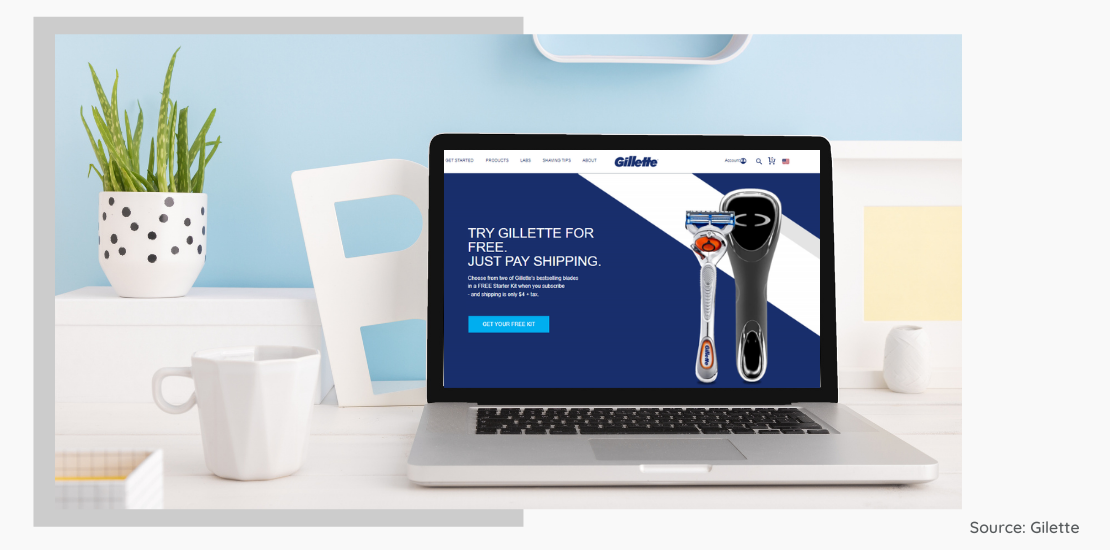

With the drastically changing dynamics of e-commerce, it's becoming necessary to consider new models besides the traditional storefronts. Therefore businesses are utilizing a new business model -not that new but definitely catching on lately- called: Direct-to-Consumer (D2C). D2C model is quickly becoming a convenient way for brands -especially the players of the FMCG industry.
The expectation of fast, secure, and reliable service has increased the demand of consumers for advanced e-commerce services. In line with this insight, to be able to provide the expected, new generation brands are taking a different route with direct-to-consumer channels.
This strategic approach has risen in popularity over the last years and transformed different industries. Let’s go through together everything you should know about the direct-to-consumer e-commerce model and its benefits.

What is the D2C business model?
D2C refers to a model that means selling items straight to the customer rather than through third-party retailers, wholesalers, or other intermediaries. With no retailer to act as a middleman, the model allows companies to establish a close connection with their customers. In the traditional sales model, the supplier was solely responsible for the product, while the retailers had an impact on the customer experience. With the D2C model, suppliers can respond to their customers' specific requests and desires.
It is clear that the direct-to-consumer business model affected the traditional models, with manufacturers leaving out the retail middleman and selling straight to the end-consumer. The D2C model includes the manufacturer taking responsibility for every step of the purchasing process, in addition to production and delivery tasks.
Embracing the direct-to-consumer approach gives several advantages to all parties of the e-commerce sphere. The competitive attitude of companies trying to adapt to this business model improves customer service and product quality. Building a business model in a consumer-focused way allows one to better understand customers and gain the necessary insights to optimize useful strategies.

What are the benefits of the D2C Model?
The features of direct-to-consumer e-commerce are beneficial both for companies and customers. Going D2C is a good way to add value to your business while also providing customers with what they desire. Through D2C models, contact with consumers at every possible touchpoint is much more convenient. Also, it allows businesses to learn consumers’ interests so companies could use the data to create a better customer experience.
D2C companies have been in place for a while. However, the use of this approach by brands has become more widespread over the past decade. This can be attributed to many factors including more affordable ways for brands to interact with their target consumers and technological innovation that facilitates D2C interactions.

A direct-to-consumer model could help businesses achieve more while giving customers better service. Let’s summarize the most outstanding perks as follows:
>> More control over your brand
Using a direct-to-consumer strategy can provide far more power than a standard business model. A D2C e-commerce approach allows the manufacturer greater control over the marketing process and sales methods, as well as direct interaction with the customer. This helps companies connect with their customers more deeply and allow customers to feel closer to the brand, establishing an emotional connection. Thanks to D2C, brands can have complete control over the brand’s perception.

>> Improved data analysis
For e-commerce to succeed in this omnichannel world, the customer must be given an excellent experience no matter how they shop. The digital world is tailored around providing a satisfactory brand offering and the way to ensure this is to get to know your consumer more, through reaching the relevant data.
Direct communication with customers in every channel of the purchasing process provides data on customer preferences. Learning the purchasing behavior of consumers helps manufacturers expand their product range, improve existing products and provide better service according to needs.
>> Better consumer experience
Having full control over the sales process, meeting the consumer in every channel, and having direct data enriches your service. Thanks to all of these, brands can accurately identify the target audiences and gain an approach that responds to all their needs by understanding them better. The D2C approach creates a suitable ground for personalized experiences while improving the bond with customers and assuring high retention.

Direct-to-Consumer Marketing Strategies
Today, most organizations that have adopted the D2C business model are developing close relationships with their customers, better understanding them, and reaching a more targeted, relevant audience. Let's look at several examples of companies that have successfully developed D2C strategies:

>> A thriving way to market entry: Dear Me
Unilever’s niche brand Dear Me is a prominent example of a successful D2C model application. At Inveon we carried out market entry, localization, and strategy building processes for the brand in a new country expansion. Through supporting the brand both as an infrastructure provider, with our platform inCommerce and a strategy consultant, through GrowthLab, during the process we achieved amazing results. Dear Me provides an experience for consumers to create their mood-based tea blends and enjoy personalized Spotify playlists. This D2C approach was supported by influencers and several other marketing activities.
>> Engage with the community: Glossier

An unconventional approach contributed to Glossier's success as a D2C brand. The company makes sure to put customers first and engages with followers through social media directly. As a major beauty company, Glossier handed out free items to 500 users who had ordered the most or connected with the company. Customers posted videos and photographs of themselves using their items and instructed visitors on how to use them effectively. Furthermore, the company encourages customers of all ages, cultures, and genders to flaunt their Glossier, making the brand approachable on different levels. The brand created a social media-shared customer experience that functions as both user-generated content and user engagement.
>> Personalize the journey: Gilette

In response to the launch of direct-to-consumer competitors such as Harry's and Dollar Shave Club, Gillette started to offer consumers an exclusive razor subscription service through their D2C model. On signing up, shoppers choose a tailored plan for delivery with optional add-ons such as shaving cream or a lotion. In addition, shoppers can customize their kits and delivery plans as they wish. This attitude of Gillette benefits from the advantages provided by the D2C business model, from increasing the loyalty of users to offering a personalized experience.

Future of D2C
Examples of brands' success mentioned above, highlight how online selling strategies are constantly evolving and the importance of staying relevant to changing consumer needs. More than ever, the rush to provide users with the best possible experiences online and directly is at the forefront.
Many brands are integrating their go-to-market strategies to include D2C and expanding their digital assets, but while doing this, it should be underlined that there are also some challenges in the D2C business model. “I want to reach the consumer, let me start right away.” is not sufficient preliminary preparation. You need to analyze the conditions of the market you are in, the unique promise of your brand, and the consumer behavior in detail and prepare for this new model operationally.
It may sound difficult. But the good news is you don't have to do it all alone. An e-commerce partner who will do the research and analysis for your brand and provide the best possible strategy will help you succeed. For brands like yours, expert teams like Inveon GrowthLab accomplish this work as an everyday task, not a big challenge to overcome.
Applying a D2C model without experiencing these possible challenges is as easy as reaching the talented teams of Inveon. While seeking a way to provide personalized and tailored experiences to shoppers by implementing D2C models, leverage the power of our platform; Inveon inCommerce to get the best outcomes from the business and stay ahead of the competition.

